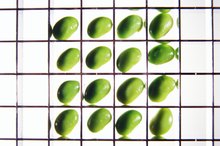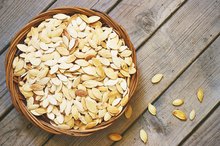Thyroid Disease & Food to Stay Away From
The thyroid is a gland in your neck that produces hormones important for a healthy metabolism, energy levels, body temperature and moods. If you have hypothyroidism, your thyroid produces too few hormones, causing lethargy, weight gain and depressive moods. An overactive thyroid, or hyperthyroidism, causes excessive hormone production, insomnia, weight loss and tremors. Both diseases are treatable, typically through synthetic thyroid medications. A healthy diet, limited in particular foods, may support medical treatment in improving your symptoms.
Soy
Soy is a protein-rich legume variety that adds nutritional benefits to many diets. If you have thyroid disease, however, substances that occur naturally in soy, known as goitrogens, can interfere with thyroid function. Because soy and other goitrogen sources provide valuable nutrients, eliminating all soy from your diet isn't necessary. Instead, registered dietitian Jennifer Sisk recommends limiting your soy intake to no more than one serving per day, or the equivalent of 4 oz. of tofu, 8 oz. soy milk or 2 tsp. of soy sauce.
- Soy is a protein-rich legume variety that adds nutritional benefits to many diets.
- Because soy and other goitrogen sources provide valuable nutrients, eliminating all soy from your diet isn't necessary.
Cruciferous Vegetables and Leafy Greens
Diet for Hyperthyroidism
Learn More
Vegetables are prime sources of antioxidants, including beta carotene and vitamin C, which support your body's ability to resist and heal from infections and disease. Like soy, however, cruciferous vegetables, including Brussels sprouts, broccoli, and cauliflower, as well as leafy greens, such as spinach, kale and mustard greens, contain goitrogens, which can inhibit thyroid functioning. For reduced thyroid disease symptoms, the University of Maryland Medical Center recommends limiting these vegetables and eating more antioxidant-rich fruits and vegetables, such as cherries, blueberries, tomatoes, bell peppers and squash.
Processed Snack Foods
Many processed snack foods, such as cookies, crackers, pie crust, pretzels and pastries, contain trans-fatty acids -- an unhealthy fat-form linked with unhealthy cholesterol levels and an increased risk for heart disease. The University of Maryland Medical Center suggests that people with thyroid disease reduce or eliminate trans-fatty acids and consume more omega-3 fatty acids for improved immune function and reduced inflammation. Valuable sources of omega-3 fatty acids include cold-water fish, such as salmon and mackerel, flaxseed, walnuts and canola oil.
Caffeinated Foods and Beverages
Bad Foods for Low Thyroid
Learn More
As a stimulant, caffeine can increase the production of thyroid hormones and worsen symptoms of hyperthyroidism such as insomnia, shakiness, sweating and anxiety. Caffeine may also cause hyperthyroidism symptoms if you are being treated for an underactive thyroid gland. Common sources of caffeine include coffee, tea, soft drinks, energy drinks, chocolate and diet shakes and bars designed to boost energy. Sugary soft drinks, milk chocolate and sweetened coffee and tea may magnify stimulatory effects and disrupt your blood sugar, moods and energy levels.
- As a stimulant, caffeine can increase the production of thyroid hormones and worsen symptoms of hyperthyroidism such as insomnia, shakiness, sweating and anxiety.
Related Articles
References
- University of Maryland Medical Center; Hypothyroidism; Steven D. Ehrlich; March 31, 2010
- University of Maryland Medical Center; Hyperthyroidism; Steven D. Ehrlich; Feb. 4, 2010
- de Souza Dos Santos MC, Gonçalves CF, Vaisman M, Ferreira AC, de Carvalho DP. Impact of flavonoids on thyroid function. Food Chem Toxicol. 2011 Oct;49(10):2495-502. doi: 10.1016/j.fct.2011.06.074. Epub 2011 Jul 2.
- Sathyapalan T, Dawson AJ, Rigby AS, Thatcher NJ, Kilpatrick ES, Atkin SL The Effect of Phytoestrogen on Thyroid in Subclinical Hypothyroidism: Randomized, Double Blind, Crossover Study. Front Endocrinol (Lausanne). 2018 Sep 11;9:531. doi: 10.3389/fendo.2018.00531. eCollection 2018.
- Sathyapalan, T.; Manuchehri, A.; Thatcher, N. et al. The Effect of Soy Phytoestrogen Supplementation on Thyroid Status and Cardiovascular Risk Markers in Patients with Subclinical Hypothyroidism: A Randomized, Double-Blind, Crossover Study.J Clin Endocrinol Metab. 2011;96(5):1442-9. DOI: 10.1210/jc.2010-2255.
- Sathyapalan T, Javed Z, Rigby AS, Kilpatrick ES, Atkin SL. Soy Protein Improves Cardiovascular Risk in Subclinical Hypothyroidism: A Randomized Double-Blinded Crossover Study. J Endocr Soc. 2017 Apr 3;1(5):423-430. doi: 10.1210/js.2016-1068. eCollection 2017 May 1.
- Tonstad, S.; Jaceldo-Siegl, K; Messina, M. et al. The association between soya consumption and serum thyroid-stimulating hormone concentrations in the Adventist Health Study-2.Pub Health Nutr. 2016;19(8):1464-70. DOI: 10.1017/S1368980015002943.
Writer Bio
August McLaughlin is a certified nutritionist and health writer with more than nine years of professional experience. Her work has been featured in various magazines such as "Healthy Aging," "CitySmart," "IAmThatGirl" and "ULM." She holds specializations in eating disorders, healthy weight management and sports nutrition. She is currently completing her second cookbook and Weight Limit—a series of body image/nutrition-related PSAs.









